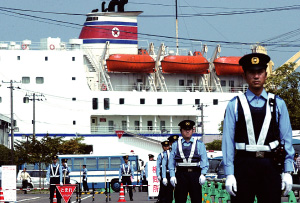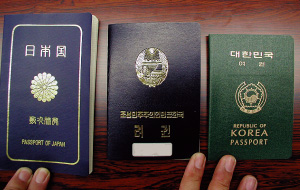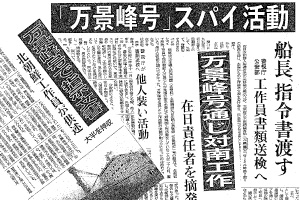In Japan, approximately 50 spy cases related to North Korea have been cleared since World War II. Overviews of
some of the recently cleared cases are as follows.
1. Case in Hyakunin-cho, Shinjuku (Cleared in 2000)
This is a spy case in which a North Korean resident in Japan and a Japanese national who were recruited as agents carried out acquisition and financial operations against South Koreans in Japan and other places after being trained as spies in North Korea.
"A," a former activist in the General Association of Korean Residents in Japan, was employed as a North Korean agent around 1979 and engaged in espionage activities against people related to South Korean military, government, and financial circles, as well as South Korean residents in Japan. Over a period of five years that started around 1997, "A" single-handedly planned and partially carried out financial operations for collecting large amounts of funds for espionage. Under the guise of performing religious activities, he also carried out operations aimed at promptly sending prisoners back to North Korea that had been detained for long periods of time in South Korea.
Japanese national "B" received instructions from North Korea and planned and partially carried out activities such as operations for disseminating publications of the underground party organization in South Korea. Furthermore, "B" approached people related to mass media and prominent figures in various circles and engaged in information gathering activities in Japan. "B" visited South Korea under the guise of performing religious activities, and carried out operations aimed at promptly sending prisoners that had been detained for long periods of time in South Korea back to North Korea.
The Metropolitan Police Department on November 21, 2000 arrested "A" for fraud and "B" for a fraudulent entry in an electromagnetic original notary deed and other offences.
2. Case in Higashi-Nakano (Cleared in 2003)This is a spy case in which "C," a former leading member of the General Association of Korean Residents in Japan, carried out various operations against South Korea after being trained as a spy in North Korea.
Around 1985 "C" star ted receiving direct instructions from the United Front Division (UFD) of the KWP, and around the year 1990 began full-fledged spy activities. In 1993, "C" came to lead other activists as the person responsible for the operation base in Japan.
Japan as a base, "C" car ried out various information gathering activities and other operations against South Korea based on instructions from the KWP. These include socalled spy activities against South Korea such as the establishment of a spy network in South Korea and operations involving the mass media and the military.
"C" received instructions from the KWP through the captain of Mangyongbong-92 that had landed at port in Japan. There were also cases in which "C" received direct instructions on the Mangyongbong-92 when leading members of the KWP visited Japan on the vessel.
On February 28, 2003 the police arrested "C" for a fraudulent entry in an original notary deed and for using the deed, as well as for violating the Immigration Control and Refugee Recognition Act, hereinafter referred to as the "Immigration Control Act."
 |
| Tight security as the Mangyongbong-92 makes port (Photo:Kyodo Press) |
3. Case in Fusekotobuki-cho (Cleared in 2004)
This is a spy case in which "D," a South Korean resident in Japan, was employed as a North Korean agent and carried out various operations against South Korea and Japan.
"D" joined the KWP in 1967. In 1970, "D" received full-fledged education as a spy over a period of three days at a North Korean embassy in a third country before beginning activities as a North Korean agent. In 1973, "D" conducted infiltration and escapes between Japan and North Korea by using spy boats and succeeded in contacting senior officials in North Korea.
"D" received operation instructions through such means as transmissions of espionage instructions from Nor th Korea and contact with Nor th Korean vessels that had made por t in Japan. "D" engaged in activities such as the subsumption and ideological education of South Korean residents in Japan, lobbying senior Korean politicians and bureaucrats, and Diet and Diet member operations through the bureaus of local assemblies in Japan. Fur thermore, in order to carry out activities in a third country, "D" illegally obtained a Japanese passport under the name of a Japanese acquaintance using his family register. A North Korean passport and a South Korean passport under "D"'s name were also found at "D"'s house.
On October12,2004 the Osaka Prefectural Police ar rested "D" for violating the Immigration Control Act as well as the Alien Registration Law.
 |
| Three types of passports possessed by "D" (Photo: Kyodo Press) |
 |
| Newspapers reporting on espionage activities carried out through the Mangyongbong-92 (January 29, 2003)(Photo: Asahi Shimbun, Tokyo Shimbun, Yomiuri Shimbun) |